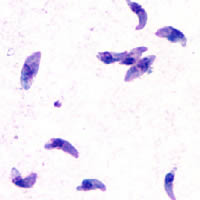
Photo from wikipedia
Objective The aim of this study was to determine the seroprevalence of Toxoplasma gondii in hemodialysis (HD) patients and to reveal the importance of toxoplasmosis as a risk factor in… Click to show full abstract
Objective The aim of this study was to determine the seroprevalence of Toxoplasma gondii in hemodialysis (HD) patients and to reveal the importance of toxoplasmosis as a risk factor in these patients. Methods The study was carried out between 26.12.2013 and 01.01.2016 at Van Yüzüncü University Dursun Odabaş the Medical Center on patients with chronic renal failure who entered HD. As the patient group in the study, 150 patients with chronic renal failure who underwent HD; as the control group, 50 people without any known chronic disease and who did not receive any immunosuppressive therapy were included. The ELISA method was used to determine anti-T. gondii IgG and IgM antibody levels. A questionnaire including risk factors that may cause the transmission of T. gondii was applied to the patient and control groups. Results In the study, 89 out of total 150 HD patients (59.3%) were found anti-T. gondii IgG antibody seropositive and 4 were (2.7%) anti-T. gondii IgM antibody seropositive. Fourteen of 50 healthy individuals in the group (28%) were anti-T. gondii IgG antibody positive, while none in this group was anti-T. gondii IgM antibody positive. Statistical analysis demonstrated there were separate significant correlations between both anti-T. gondii IgG (p<0.01) and anti-T. gondii IgM antibody (p<0.05) frequencies with chronic renal failure. While there were no statistically significant differences in the prevalence of anti-T. gondii IgG antibody identification based on gender and age groups, there were significant differences between the prevalence of anti-T. gondii IgM antibody based on both gender (p<0.05) and age groups (p<0.05). Some living conditions and habits of the patient group were evaluated statistically, and a significant correlation (p<0.05) was found between eating only raw meatballs and toxoplasmosis seropositivity. Conclusion As a result, it was understood that the physicians who monitor of HD patients should assess toxoplasmosis among the risk factors.
Journal Title: Turkiye parazitolojii dergisi
Year Published: 2022
Link to full text (if available)
Share on Social Media: Sign Up to like & get
recommendations!